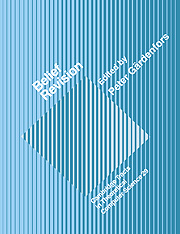Book contents
- Frontmatter
- Contents
- Belief revision: An introduction
- Reason maintenance and belief revision: Foundations versus coherence theories
- Syntax based approaches to belief revision
- A dyadic representation of belief
- On the logic of theory change: More maps between different kinds of contraction functions
- Belief change and possibility theory
- On the difference between updating a knowledge base and revising it
- Planning from first principles
- Autonomous belief revision and communication
- Conditionals and knowledge-base update
- Index
Belief revision: An introduction
Published online by Cambridge University Press: 21 September 2009
- Frontmatter
- Contents
- Belief revision: An introduction
- Reason maintenance and belief revision: Foundations versus coherence theories
- Syntax based approaches to belief revision
- A dyadic representation of belief
- On the logic of theory change: More maps between different kinds of contraction functions
- Belief change and possibility theory
- On the difference between updating a knowledge base and revising it
- Planning from first principles
- Autonomous belief revision and communication
- Conditionals and knowledge-base update
- Index
Summary
THE PROBLEMS OF BELIEF REVISION
An Example
Suppose that you have a database that contains, among other things, the following pieces of information (in some form of code):
α: All European swans are white.
β: The bird caught in the trap is a swan.
γ: The bird caught in the trap comes from Sweden.
δ: Sweden is part of Europe.
If your database is coupled with a program that can compute logical inferences in the given code, the following fact is derivable from α – δ:
ε: The bird caught in the trap is white.
Now suppose that, as a matter of fact, the bird caught in the trap turns out to be black. This means that you want to add the fact –ε, i.e., the negation of ε, to the database. But then the database becomes inconsistent. If you want to keep the database consistent, which is normally a sound methodology, you need to revise it. This means that some of the beliefs in the original database must be retracted. You don't want to give up all of the beliefs since this would be an unnecessary loss of valuable information. So you have to choose between retracting α, β, γ or δ.
The problem of belief revision is that logical considerations alone do not tell you which beliefs to give up, but this has to be decided by some other means.
Information
- Type
- Chapter
- Information
- Belief Revision , pp. 1 - 28Publisher: Cambridge University PressPrint publication year: 1992
Accessibility standard: Unknown
Why this information is here
This section outlines the accessibility features of this content - including support for screen readers, full keyboard navigation and high-contrast display options. This may not be relevant for you.Accessibility Information
- 56
- Cited by
